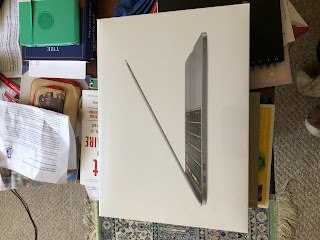I have been told I need to write about things more interesting than the household finances (!), and so I shall write today about cleaning out our principal closet this weekend. Sadly, it is still a work in progress because that closet is a horror of correspondence from Revenue Canada, hospitals, and other unpleasant places I'd rather not think about. There are also hundreds, if not thousands, of handmade Polish and Italian flashcards, and a large number of books because we still haven't convinced a carpenter to come and build us a bookcase. (No, we do not want to buy a bookcase from IKEA.)
I spent six hours or so sorting through papers, mementos, and scraps of gift wrap, for we have three large plastic containers dedicated to Important Papers, Memories, and Stationary (including Gift wrapping). The Important Papers go back to 1995, the Memories to the mid-1970s, and from the looks of things, the Stationary goes back to 2009--but who knows how old random pens can be?
As I sifted, sorted, and threw away, I thought about the famous environmentalist/minimalist Rob Greenfield, who owns almost nothing and is happy, to paraphrase the fanciful World Economic Forum prediction for 203. In 2021, Greenfield owned 44 things, including a Mahatma Gandhi bookmark and $3,000 US or so in cash. (The cash counted as one thing.) I wondered how Rob had the guts to throw away Inland Revenue correspondence and the heart to throw away grandma stuff. In the Memories box I found a First Communion card from my German-American convert grandmother (1904-1992).
I also found a letter to myself at 30 from myself as a teenager. I first found it when I was over 40, and my heart beat like a European ambulance siren. I was terrified by how I would appear to my teenage self--not the reaction I expected when I was a teenager. (To tell you the truth, I don't know what I expected.) Unlike the simple "God bless you" of my grandmother, the letter from myself suggested something akin to the Proximate Judgement. Like many of my bad ideas, the letter was originally the idea of Lucy Maud Montgomery, and now that I think about it, the heroine felt rather sad when she read hers. Me, I felt relieved that it was not as starry-eyed as I imagined and that I had fulfilled at least two of the stated goals.
Naturally there were various letters and forms full of Latin and Greek looking words about Benedict Ambrose's adventures in cancer. There were also notes in my handwriting of things to ask B.A.'s doctors and things to ask him. These were instruction from Ma Belle Soeur, who is a paediatrician, and it is not the least of God's mercies that B.A.'s cancer was paediatric in nature. There was also an information pamphlet about Power of Attorney. I stuffed all those things in an envelope and kept them. Since his recovery, B.A. has become an archivist, and if anything deserved archiving, it's that stuff.
Meanwhile, I will never tire of telling young Catholic ladies in the Traditionalist movement that husbands get sick and die, so they had better have something to fall back on if theirs get sick and die sooner rather than later. This something could be a nest-egg, an education, or a trade. I think the most logical thing for Trad Cath Girl to do as soon as she has determined she does not have a vocation to religious life is to get a diploma or a degree in something that leads to a solid job and then to live at home and save as much money as possible before she gets married. The longer before she gets married, the richer she will be. How I wish I had thought up this advice before I married, alas, alas. Fortunately for me, my husband did not actually die, and English Lit and theology degrees plus 15 years of freelance writing can actually get you a job.
Sunday afternoon's bout of closet cleaning was easier, for it mostly consisted of dragging things out of the closet, shaking off the dirt or dust, and putting them in piles. It is still not done, and I am not sure what to do with the old computers. I suppose there must be a way of downloading everything onto a stick, wiping the hard drives, and selling them to a shop in Edinburgh. It sounds incredibly boring and difficult--an even worse form of closet-cleaning--but at least then the electronics will finally be gone, and the closet will be all ours.

No comments:
Post a Comment